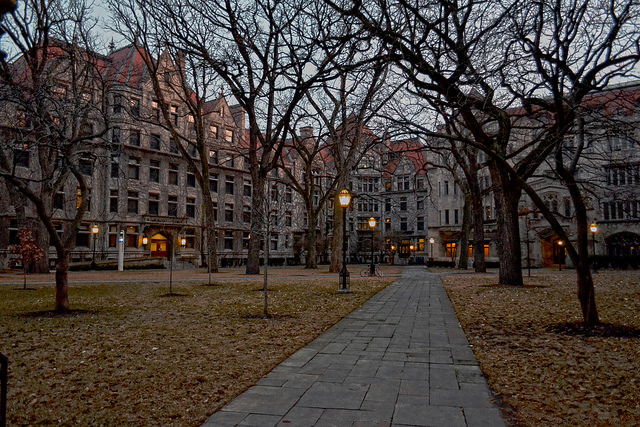UChicago Faculty Respond To 'Trigger Warnings' Controversy With Open Letter
By Rachel Cromidas in News on Sep 13, 2016 7:36PM
Scores of University of Chicago faculty members have responded to a brewing controversy over the Hyde Park school's official stance on the increasing use of "trigger warnings" and "safe spaces" in academia in an open letter.
The letter, published in the student newspaper, the Maroon, on Tuesday, comes in response to a letter sent by the Dean of Students to incoming college freshman last month that went viral. The letter drew national attention and sparked a firestorm around the subject of free speech and the perception by some that elite universities are coddling students by catering to their desires to have certain types of academic content that deal with racism, rape and trauma as triggering.
Last month, UChicago alum Cassandra Walker told us why she thinks trigger warnings and safe spaces are important parts of the college experience, especially for students of color, LGBTQ students and students who have experienced trauma or come from disadvantaged backgrounds. Now this letter, signed by over 100 professors who teach or have taught in the college, says that many faculty members disagree over whether and when it is appropriate to use trigger warnings in the classroom, but they still dispute aspects of the dean's letter and its tone.
"We deplore any atmosphere of harassment and threat," the letter reads, after explaining that "safe spaces" have an important history in civil rights movements and feminism, and should not necessarily be divorced from the classroom.
"It would be naïve to think that the University of Chicago is immune from social problems," the letter says. "Yet the administration confusingly disconnects “safe spaces” it supports (see the list of mentoring services on the College’s own website) from “intellectual safe spaces” that it does not, as if issues of power and vulnerability stop at the classroom door."
Here's the full letter:
"Dear Students of the Class of 2020:As you have undoubtedly noticed, you and your new institution have been in the media spotlight lately. We want to take this opportunity to voice our own welcome as members of the faculty. You will find the University of Chicago to be a diverse place full of strong-minded people. We encourage you to become one of them.
Those of us who have signed this letter have a variety of opinions about requests for trigger warnings and safe spaces. We may also disagree as to whether free speech is ever legitimately interrupted by concrete pressures of the political. That is as it should be. But let there be no mistake: such requests often touch on substantive, ongoing issues of bias, intolerance, and trauma that affect our intellectual exchanges. To start a conversation by declaring that such requests are not worth making is an affront to the basic principles of liberal education and participatory democracy.
Foremost, we are committed to our students and to the free exchange of ideas. As teachers, we understand ourselves to be engaged in a collaborative experiment in the classroom. For that to work, mutual respect is indeed indispensable—all the more so since the practice of academic freedom can sometimes be contentious, difficult, perhaps even painful. But the crucial point is that such contention has to be based on a commitment to learning from a wealth of histories and experiences—to more discussion, not less; to openness, not closure.
The history of “safe spaces” goes back to gay, civil rights, and feminist efforts of the mid-20th century to create places protected from quite real forces of violence and intimidation. They also served as incubators of new ideas away from the censure of the very authorities threatened by these movements. It would be naïve to think that the University of Chicago is immune from social problems. Yet the administration confusingly disconnects “safe spaces” it supports (see the list of mentoring services on the College’s own website) from “intellectual safe spaces” that it does not, as if issues of power and vulnerability stop at the classroom door.
The best spaces for independent thought and action may be those you create yourselves. For example, graduate student instructors at the University of Chicago have just won the right to organize as a labor union. We applaud their contributions to this national effort. Please see the statement of the University of Chicago chapter of the American Association of University Professors for further evidence of widespread faculty support of student activism and student rights.
The right to speak up and to make demands is at the very heart of academic freedom and freedom of expression generally. We deplore any atmosphere of harassment and threat. For just that reason, we encourage the Class of 2020 to speak up loudly and fearlessly."
